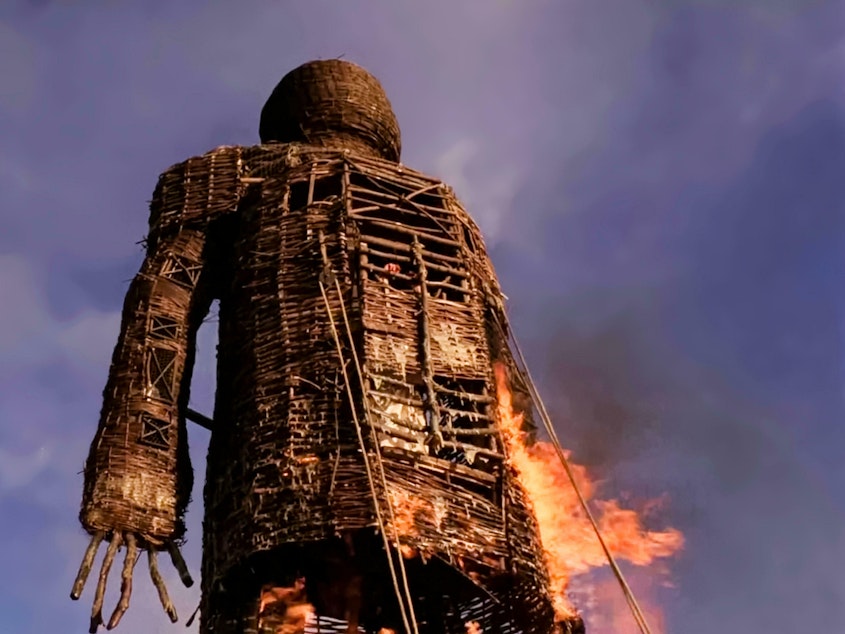'The Wicker Man' gets his AARP card today, as the folk horror classic turns 50

The influential horror movie The Wicker Man came out Dec. 6, 1973. It eventually inspired an entire subgenre known as "folk horror," including films such as 2019's acclaimed Midsommer.
But when it was first released, The Wicker Man was seen as an obscure cult classic – if it was even seen at all.
"For a very long time, no one cared about The Wicker Man," says Grady Hendrix, author of numerous novels, including How to Sell a Haunted House and the forthcoming Witchcraft for Wayward Girls.
"It's a low budget movie filmed in Scotland, about a police officer who goes to investigate the disappearance of a small girl on an outlying island," Hendrix explains. "He is a devout Christian and is horrified to discover that this island still practices pagan rituals to ensure that it has a good harvest the following year."
At first, the rituals seem harmless, even charming. Maypoles, a bit of nude frolicking outdoors, talk of a springtime festival. But the villagers' activities turn increasingly sinister. A dead hare, buried in a coffin. A masked procession to an ancient henge, in grotesque costumes such as stags, rabbits and frogs. Human sacrifice, it is suggested, is routinely practiced as part of the religion.
Sponsored
The Wicker Man's genesis, explains Hendrix, lies in a couple of books celebrating pagan-era rituals that supposedly survived in altered forms: The Golden Bough, by Sir James George Frazer and first published in 1890, and Margaret Murray's The Witch-Cult in Western Europe, from 1921.
"They harkened back to a time when we were more connected to the land, before modernity, before all these machines and all these schedules and all these trains started messing everything up. Back when we were 'real,' good people who went by the old ways and worshipped the folk spirits," Hendrix notes dryly.
The connections in those books, from ancient practices to contemporary ones are tenuous at best, Hendrix says, and much of it is largely fabricated. But they informed — and continue to inform — popular culture. The Golden Bough was frequently cited by director Robin Hardy and screenwriter Anthony Shaffer as inspiring The Wicker Man.
In the early 1970s, The Wicker Man resonated with the back-to-the land movement and the rise of alternative religions such as Wicca. The film can also be understood in the context of a wave of low-budget horror movies arriving in the wake of the global trauma of the Vietnam War.
Then in the 1980s and '90s, a new generation discovered the movie on videos and DVDs. Fans were thrilled by its dramatic structure.
Sponsored
"Anthony Shaffer was a real genius of construction," Hendrix says of The Wicker Man's screenwriter, noting that in 1970, Shaffer's Sleuth had won a Tony award for Best Play on Broadway.
"Sleuth was a huge hit. It's basically a mystery inside a mousetrap game. It's beautiful in the way it unwinds. And The Wicker Man, despite being a very hippy dippy movie that seems to move at this shambling rhythm, has a climax where you suddenly realize you have been ambling along with the good people of Summerisle all through the whole movie. You've been wandering deeper and deeper into a steel clockwork trap.
"In the last scene is where it all snaps shut... There's something so beautiful and how perfectly and meticulously it's constructed so that you don't even see that it's constructed at all."
The Wicker Man has seen several sequels since its initial release. One notoriously bad 2016 remake, written and directed by Neil LaBute, starred Nicolas Cage. According to a 2006 story in The New York Times, it annoyed the original director.
"I think it's a homage," Cage said at the time. "It's a way of us saying this is a wonderful film. It's not us saying that we are better. If anything, it is a tip of the hat, and perhaps it will inspire people to look at the original again."
Sponsored
Radio story edited by Rose Friedman. [Copyright 2023 NPR]



